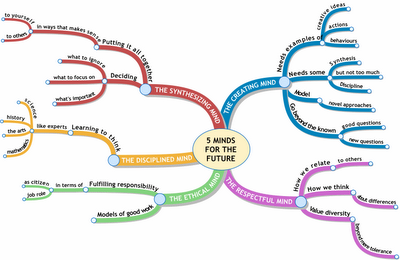Five Minds for the Future? One Good Mind Would Do Wonders
 Howard Gardner is a prolific author, Psychologist, and Harvard Professor. Gardner is perhaps best known for his tendency to multiply intelligences beyond what most experts feel is necessary. (apologies to Occam) Gardner's latest work, Five Minds for the Future, might at first seem to be following in the footsteps of his previous Multiple Intelligences work. Here is the distinction:
Howard Gardner is a prolific author, Psychologist, and Harvard Professor. Gardner is perhaps best known for his tendency to multiply intelligences beyond what most experts feel is necessary. (apologies to Occam) Gardner's latest work, Five Minds for the Future, might at first seem to be following in the footsteps of his previous Multiple Intelligences work. Here is the distinction:The five minds—disciplined, synthesizing, creating, respectful, and ethical—differ from multiple intelligence in working in a more synergistic fashion as opposed to separate categories of intelligences.Source.
 If you look at the graphic above, you will see that Gardner is actually describing the way "one good mind" would function at its integrated best. Gardner seems to have hit on some valuable principles of mind formation here.
If you look at the graphic above, you will see that Gardner is actually describing the way "one good mind" would function at its integrated best. Gardner seems to have hit on some valuable principles of mind formation here.The mind must be DISCIPLINED in three senses. The person must be able to think in terms of the major scholarly disciplines (history, mathematics, science, and the arts); he/she must have at least one area of expertise; he/she must have those habits of continued application so that learning can continue throughout life.Source.
Nobel laureate Murray Gell-Mann argues that in the 21st century, the most important mind will be the SYNTHESIZING MIND. Individuals are subjected to huge amounts of information. We must be able to decide what is important; how best to organize it for ourselves; how best to communicate it to others. Almost everything that can be automated will be.
The last frontier for the mind is that of CREATING New Ideas.... thinking outside of the box. Such thinking presupposes a certain discipline and considerable synthesizing ability but it cannot be constrained by what has been thought or done before.
The first three kinds of minds are cognitive. The last two relate to the world of other individuals, and are thus more social and affective.
The RESPECTFUL MIND goes beyond mere tolerance. Respectful persons welcome human diversity, seek to understand and work with others, and cultivate an atmosphere of openness and reciprocity.
The ETHICAL MIND builds upon respect but entails a more abstract attitude. Ethical individuals ponder their roles as workers and citizens. They carry out good work... work that is excellent, ethical and personally meaningful. They consider their roles as citizens of their community, their region, and the globe and act in constructive, non egocentric ways.
Gardner heads up Harvard's Project Zero educational research group. Certainly if the abysmal failure of government education in North America is to be salvaged, new ideas and approaches will be vital. It appears that government education has failed in developingevery single one of the five minds that Gardner highlights. Instead, schools develop the resentment mind, the entitlement mind, the addicted mind, the dependent mind, the lazy mind, indiscriminate mind, and the credulous mind. There is certainly a lot of work to be done, and one hopes that Gardner and his group will lend a hand.
Gardner's 11/10/06 (11 October) lecture on audio and transcript (scroll halfway down)
Hat tip The Mouse Trap blog.
Labels: Intelligence

0 Comments:
Post a Comment
“During times of universal deceit, telling the truth becomes a revolutionary act” _George Orwell
<< Home